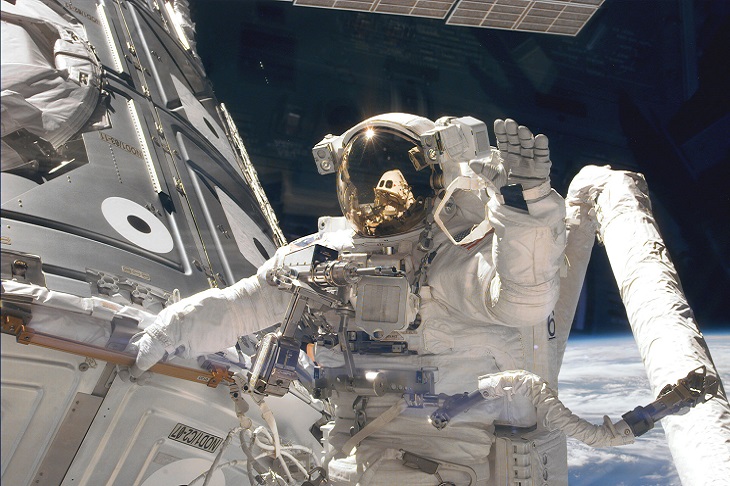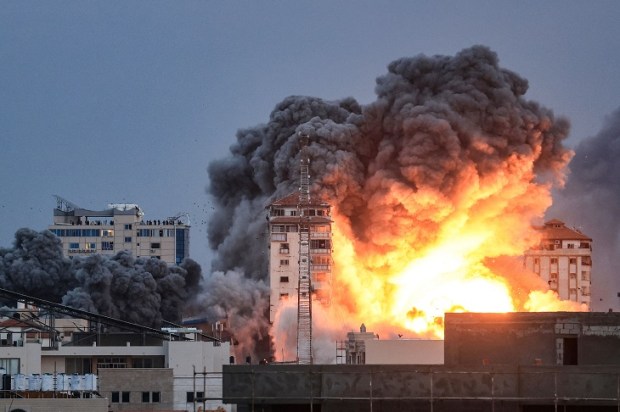‘Twitter is not real life!’ insist ‘professional’ political commentators.
Their denials grow weaker as the prime ministers and presidents of the world’s most powerful nations tweet passive-aggressive insults at each other while real bombs fall on cities. Not only has Twitter and the wider oligarchy of social media formed a patent on ‘truth’, it has become a battleground for propaganda.
This time, the fate of the International Space Station could be decided by the ongoing Twitter war between Russian and American space agencies – mediated via Twitter’s automatic Google translate function (known for its reliability?) What could possibly go wrong…
Concerns grew for the safety of the International Space Station and its occupants when rumours circulated that the head of Russia’s space agency, Dmitry Rogozin, was tossing up abandoning American astronaut Mark Vande Hei. He was due to return to Earth at the end of March courtesy of a Russian spacecraft landing in Kazakhstan. It is part of the regular mission staff rotation. At the moment there are two Russian cosmonauts, three Americans, and one German. After the reshuffling on March 18, there will be three Russians, three Americans, and one German.
Although Nasa diplomatically said that it was seeking ‘operational flexibility’ with Russia, Mark Vande Hei will find a way back to Earth that doesn’t involve a parachute. Still, it’s not a good sign when Rogozin insists that he’s going to separate the Russian and American sections of the International Space Station – given that both sides are required to operate its power and controls.
Rogozin’s immature tweeting comes within the context of the Ukraine-Russia war which became a hot war two weeks ago when Putin invaded Ukraine. While Putin is not technically ‘at war’ with Europe or America, there is a proxy conflict going on with America and Europe sending military aid and enacting severe sanctions on Russia.
Aside from piquing our curiosity about what historic wars would look like if the likes of Napoleon, Caesar, or Genghis Khan could tweet insults, watching adults with genuine power snipe at each other like a pair of teenage girls fighting over a boy is alarming.
The exchange was triggered by American President Joe Biden.
‘We estimate that we will cut off more than half of Russia’s high-tech imports […] it will degrade their aerospace industry, including their space program,’ mumbled Biden, during a White House press conference.
Nasa was forced to follow up with a clarification, insisting that the sanctions would not impact Nasa’s ongoing work with Roscosmos – their Russian counterpart – at the International Space Station.
It was almost as if Biden had declared his ‘tough sanctions’ without first checking if his astronauts were safe in a repeat of his earlier error to boycott Russian oil when his party has been pursuing the destruction of domestic oil production.
‘The new export control measures will continue to allow US-Russia civil space cooperation. No changes are planned to the agency’s support for ongoing in-orbit and ground station operations,’ explained Nasa, no doubt sweating all over their consoles.
Rogozin was not impressed, issuing his reply via a series of tweets in Russian, roughly translating to:
‘Biden said the new sanctions would affect the Russian space program. OK. It remains to find out the details:
- Do you want to block our access to radiation-resistance space microelectronics? So you already did it quite officially in 2014. As you noticed, we, nevertheless, continue to make our own spacecraft. And we will do them by expanding the production of the necessary components and devices at home.
- Do you want to ban all countries from launching their spacecraft on the most reliable Russian rockets in the world? This is how you are already doing it and are planning to finally destroy the world market of space competition from January 1, 2023 by imposing sanctions on our launch vehicles. We are aware. This is also not news. We are ready to act here too.
- Do you want to destroy our cooperation on the ISS? This is how you already do it by limiting exchanges between our cosmonaut and astronaut training centres. Or do you want to manage the ISS yourself? Maybe President Biden is off topic, so explain to him that the correction of the station’s orbit, its avoidance of dangerous rendezvous with space garbage, with which your talented businessmen have polluted the near-Earth orbit, is produced exclusively by the engines of Russian Progress MS cargo ships. If you block cooperation with us, who will save the ISS from an uncontrolled de-orbit and fall into the United States or Europe? There is also the option of dropping a 500-ton structure to India and China. Do you want to threaten them with such a prospect? The ISS does not fly over Russia, so all the risks are yours. Are you ready for them?
Gentlemen, when planning sanctions, check those who generate them for illness Alzheimer’s. Just in case. To prevent your sanctions from falling on your head. And not only in a figurative sense.
Therefore, for the time being, as a partner, I suggest that you do not behave like an irresponsible gamer, disavow the statement about “Alzheimer’s sanctions”. Friendly advice.’
In this case, Rogozin was making a joke (we hope) in response to President Joe Biden’s earlier comments about American sanctions degrading Russia’s space industry.
The situation was made worse when video footage emerged of partner countries scrubbing out the Russian flag from rockets headed to the International Space Station. This caused Scott Kelly, former Nasa astronaut and Russian space chief and Rogozin to engage in an alarming Twitter battle – some of which has been deleted.
‘The launchers at Baikonur decided that without the flags of some countries, our rocket would look more beautiful,’ tweeted Rogozin, of the Russian rocket being stripped of its flags.
To which Kelly replied, ‘Dimon, without those flags and the foreign exchange they bring in, your space program won’t be worth a damn. Maybe you can find a job at McDonald’s if McDonald’s still exists in Russia.’
‘Get off, you moron! Otherwise the death of the ISS will be on your conscience!’ tweeted back Rogozin, before hastily deleting it.
‘Dimon, why did you delete this tweet? Don’t want everyone to see what kind of child you are?’
‘Mr. Scott Kelly! You needlessly provoke me. We are not familiar with you, but you … call me “Dimon”, although I do not know such a treatment and I will not allow you to behave like that with me. You are being defiant and destructive.’ Rogozin’s annoyed reply came in English, after he took offence at Kelly using what is essentially a ‘pet name’ instead of his formal name.
‘Perhaps the dementia and aggression that you have developed is a consequence of the overload and stress of four flights into space. I invite you to undergo an examination at the Brain Institute of our Federal Medical and Biological Agency.’
This is the ‘Russian roulette’ of sanctions where the unlucky shot isn’t only stranded astronauts stuck in a super-awkward situation with Russian colleagues, it’s a flying man-made rock.
A casual glance at the International Space Station tells you that it’s not aerodynamic, nor was it launched as a single vessel, rather it was built in space over 20 years with 42 launches. The orbiting lab currently weighs 420,000 kg and is almost as large as a football field. And yes – when it’s time for it to be decommissioned – it will die in a fireball crashing into the planet it has been majestically orbiting around. In retrospect, we probably should not have built it to be quite so big.
‘We built the largest peacetime engineering project ever, and by building pieces of an overall spacecraft that never actually saw each other or touched each other until they got to orbit. No one had any idea how to build something like this when we started out on the ISS. It’s huge, it’s complicated, and it’s practically unbelievable. But the instant human intervention ends, the space station’s life is limited,’ said Christian Maender of Axiom to Space.com.
It may also become a weapon of war, sacrificed by Russia as punishment to the West. While it lacks the scale of the already-threatened nuclear option, crashing the International Space Station into America or one of its allies certainly boasts a fair bit of drama. That’s the problem with Putin. Empire-builders obsessed with the ‘glorious history of their nation’ are drawn to theatrical displays of violence. In this case, there is no trigger for Putin to pull, or red button to push. All Russia has to do is – nothing.
While the International Space Station is often thought of as a US-Russian affair – the love child after the Cold War – the European Space Agency, the Canadian Space Agency, and the Japan Aerospace Exploration Agency all have a stake in the project.
As a Low-Earth Orbiting lab, it runs experiments in a microgravity environment which are particularly important for the development of new materials. One of its more annoying features are the newly installed climate sensors used to feed weather information into the global warming models that raise our taxes. Axiom Space is interested in the survival of the International Space Station because Nasa awarded the company use of its docking port as the beginning of a commercial project intending to detach part of the station for use in human space exploration (and shedding a few kilos).
Commercialisation follows colonisation with the same inevitability that catastrophe chases communism.
That said, the main reason the International Space Station is still in orbit is because everyone’s nervous about getting it down. ‘We didn’t actually think through the details [of getting it out of orbit] until about five years ago,’ admitted Jonathan McDowall from Harvard. It’s inevitable end keeps getting delayed despite its respirator costing governments a fortune. There is a risk (to the ordinary inhabitants of Earth) that its demise as an act of war might be convenient for more than Russia.
The ‘happy ending’ for the International Space Station is to (somehow) survive the political row on Earth and continue as planned through its 2030 transition phase then, for the parts that are no longer required, a controlled re-entry that ends with a splash in the South Pacific Ocean Uninhabited Area.
The ‘unhappy ending’ is something with the size and force of an aircraft crashing into a densely populated city at full speed.
Despite its lengthy review for the American government, Nasa ignored the most significant threat to the survival of their dream to ‘inspire humanity’ – and that is the dark nature of humanity itself. The Twitter battle is looking less like a ‘joke’ and more like a ‘threat’ when Rogozin followed up with this tweet on Sunday night:
‘The West, and especially America, bear the main responsibility for the crisis that began in February 2014. It has now turned into a war that not only threatens to destroy Ukraine, but could escalate into a nuclear war between Russia and Nato.’
Russia has already stopped cooperating with the German astronaut, using their official Twitter account to announce:
‘Russian space program will be adjusted against backdrop of sanctions, the priority will be the creation of satellites in the interests of defense.’
Which followed an earlier tweet in English telling all the American brands engaged in a Russian boycott that there is ‘not enough space for everyone’ to return to Russia – essentially stirring the pot to see when greed outweighs cancel culture.
This is not the first time domestic hostilities have reached space. China’s rapid expansion into the evening sky has led to grave concerns about the imminent militarisation of space, transforming it from a scientific playground into the next frontier of conflict.
At first humans treated space as the mythical heavens – a place we thought belonged to the realm of the gods. Now, we are those warring Greek gods above the Earth, tossing thunderbolts at each other to the terror of those left on the ground.
Got something to add? Join the discussion and comment below.
Get 10 issues for just $10
Subscribe to The Spectator Australia today for the next 10 magazine issues, plus full online access, for just $10.

























Comments
Don't miss out
Join the conversation with other Spectator Australia readers. Subscribe to leave a comment.
SUBSCRIBEAlready a subscriber? Log in